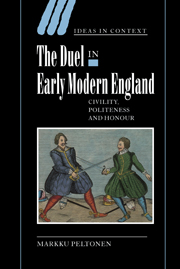Book contents
- Frontmatter
- Contents
- Acknowledgements
- Introduction
- 1 The rise of civil courtesy and the duelling theory in Elizabethan and early Stuart England
- 2 The Jacobean anti-duelling campaign
- 3 Duelling, civility and honour in Restoration and Augustan England
- 4 Anti-duelling campaigns 1660–1720
- 5 Politeness, duelling and honour in Bernard Mandeville
- Epilogue
- Bibliography
- Index
- IDEAS IN CONTEXT
2 - The Jacobean anti-duelling campaign
Published online by Cambridge University Press: 22 September 2009
- Frontmatter
- Contents
- Acknowledgements
- Introduction
- 1 The rise of civil courtesy and the duelling theory in Elizabethan and early Stuart England
- 2 The Jacobean anti-duelling campaign
- 3 Duelling, civility and honour in Restoration and Augustan England
- 4 Anti-duelling campaigns 1660–1720
- 5 Politeness, duelling and honour in Bernard Mandeville
- Epilogue
- Bibliography
- Index
- IDEAS IN CONTEXT
Summary
‘TO PREVENT THESE PERNICYOUS DUELLS’
‘I do not remember’, wrote one of the critics of duelling, ‘that any capital crime, but this of duels, is frequently and publicly defended by persons otherwise discreet and sober.’ He had known, he went on, ‘a youth in the fourteenth year of his age’ who had been exceptionally reticent ‘until I chanced to speak of the point of honour and duels’. When this topic had been broached, the youth had suddenly become exceptionally loquacious, rehearsing ‘the discourse which he [had] heard from his father’ who had been an expert ‘in the mistaken points of honour’.
If the theory of duelling became quickly established in England in the latter part of the sixteenth century, the concomitant social habit quickly followed suit. But we can now see that when the Elizabethan and Jacobean courtiers, nobles and gentlemen gave each other the lie, issued challenges and fought duels, they were not so much returning to their native chivalric past but rather consciously imitating fashionable foreign habits. When the notorious duellist Lord Herbert of Cherbury discussed in his autobiography ‘the discreet civility which is to be observed in communication either with friends or strangers’, he recommended ‘Guazzo de la Civile Conversation and Galeteus de Moribus’.
The earl of Essex's penchant for single combats could well have been an index of his willingness to imitate the Italian Renaissance ideals rather than a sign of his indebtness to the medieval honour culture.
- Type
- Chapter
- Information
- The Duel in Early Modern EnglandCivility, Politeness and Honour, pp. 80 - 145Publisher: Cambridge University PressPrint publication year: 2003

